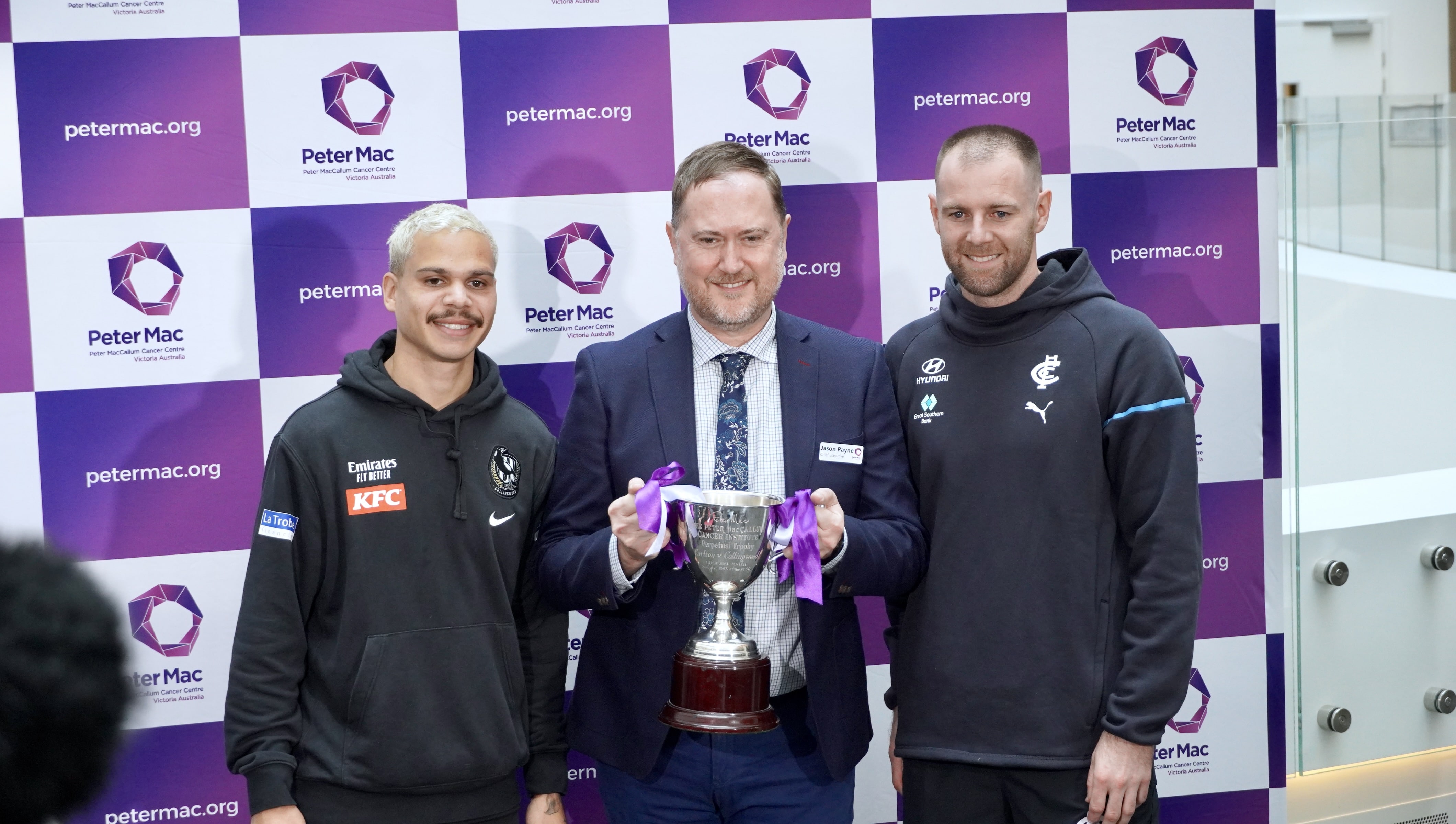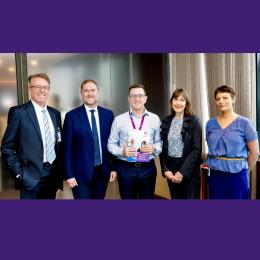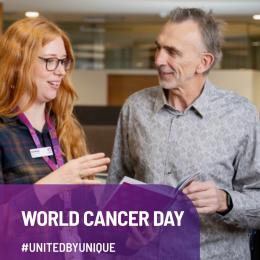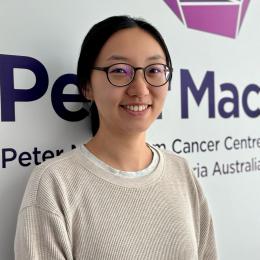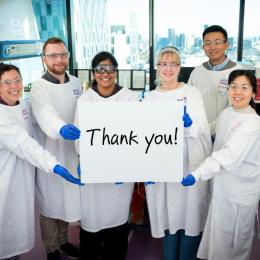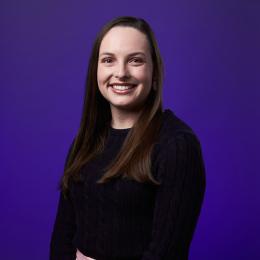Malcolm’s hope for the future of melanoma research
4 min read 09 October 2024
After enduring all the “grim and awful stuff” of stage four melanoma, Malcolm doesn’t think of himself as a ‘survivor’. He shares his remarkable cancer journey and his commitment to supporting the next generation of talented clinician-researchers at Peter Mac.
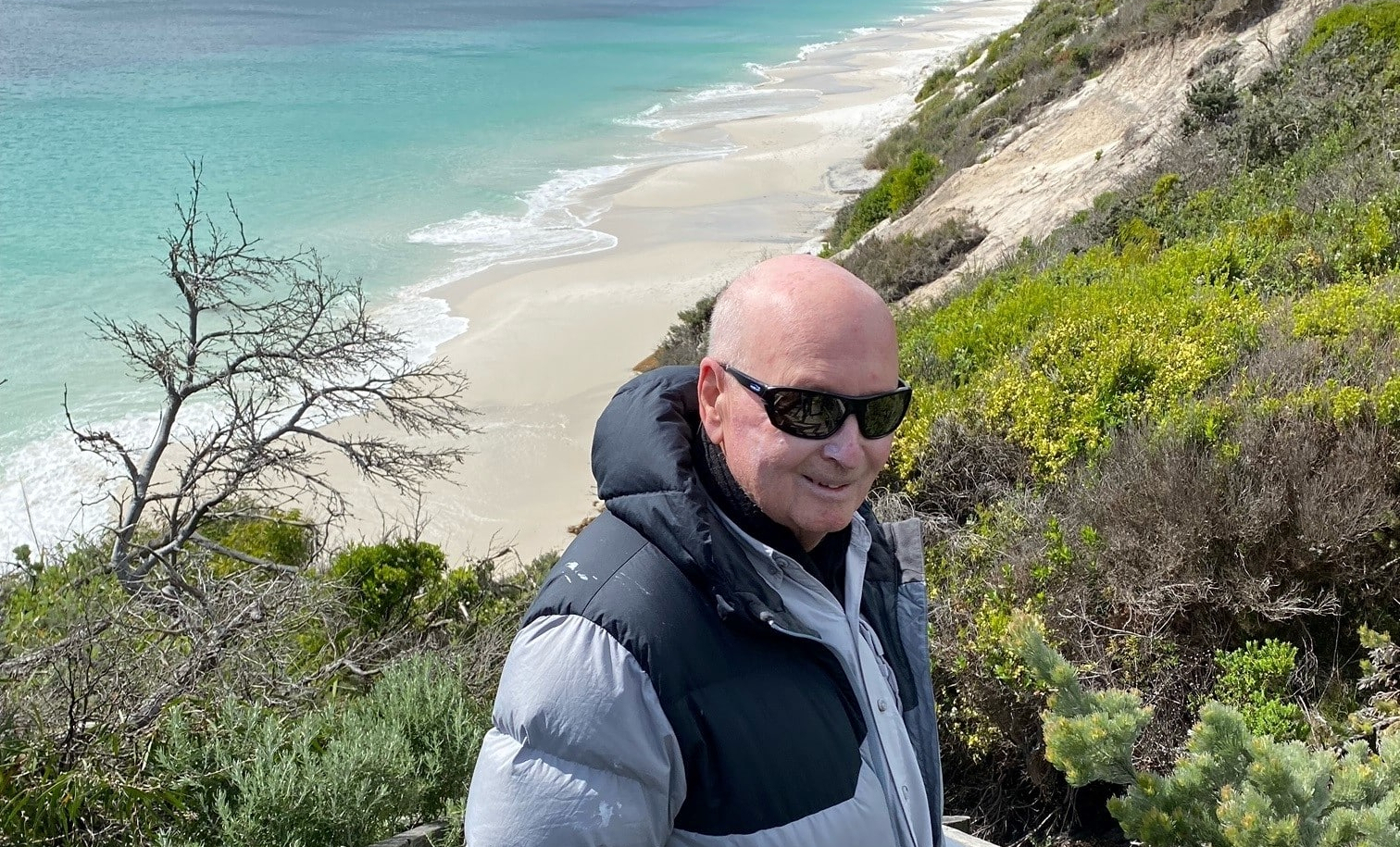 Malcolm down at Goode Beach
Malcolm down at Goode Beach
Shark bite
Fair-skinned, inheriting his mother’s Scottish genes, Malcolm grew up on the sunny beaches of Perth in the 1960s.
“We didn’t have Slip, Slop, Slap back then,” he says. “Just get burnt and peel the skin off. Who needs sunscreen or a hat?”
His first scrape with melanoma came at the age of 46, when he was living and working in Melbourne. He noticed a white pinhead sized bubble on his chest, and a friend urged him to see a dermatologist.
“I thought it wasn’t melanoma because I thought they’re dark coloured and mine was white. I remember squeezing it thinking it was going to pop. As it turns out, it was probably one of the most aggressive melanomas you could get.”
Malcolm was referred to a Collins Street dermatologist, where the ‘bubble’ was excised, followed by surgery to remove the surrounding tissue. No further treatment was required, and within eight weeks, he was back at work.
Malcolm labelled his cancer ‘the nuisance’ and put the episode behind him; a gnarly scar across his chest the only telltale sign.
His hand instinctively moves to his chest as he recalls a day fishing off the beach at Torquay.
“It was a really hot day. I had all the sunscreen on, but this kid came up to me, looked at the scar on my chest, and asked, ‘What happened?’ I said… ‘Shark bite!’”
“He ran away as fast as he could, then came back about 20 minutes later with his parents. He pointed at me and said, ‘Mum, there he is! Shark bite!’”
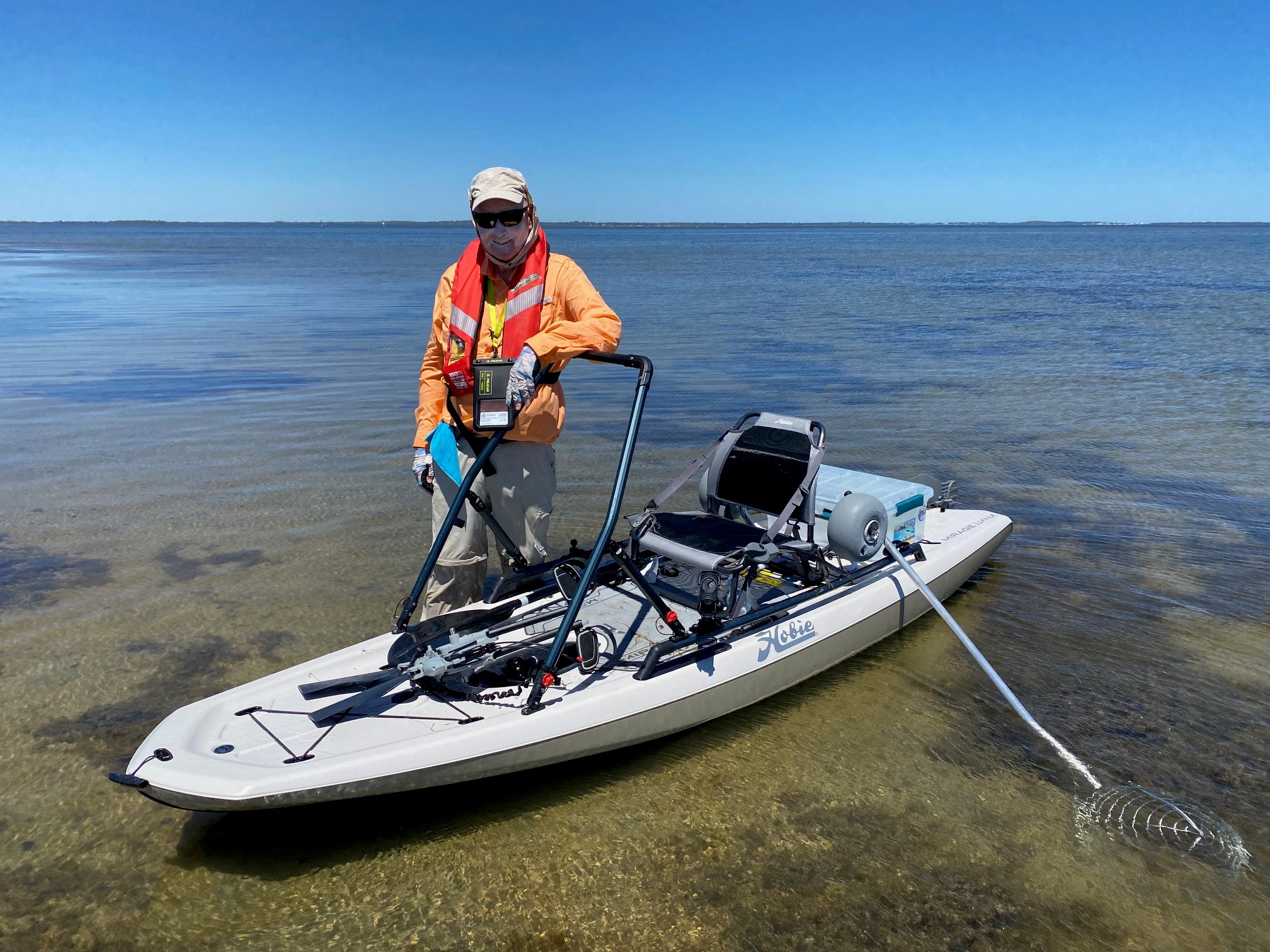 “A great ad for sun protection”, says Malcolm
“A great ad for sun protection”, says Malcolm
Time to give back
Grateful for his positive experience, Malcolm became an avid supporter of melanoma research.
“Being from Perth, I knew of Scott Kirkbride, a young golfer who died from melanoma when he was just 27 years old.”
When Scott’s life was tragically cut short by melanoma in 2004, his parents established the Kirkbride Foundation. Fundraising efforts by Scott’s family, friends, and community supporters like Malcolm helped researchers at the Harry Perkins Institute in WA investigate new treatments for melanoma.
Malcolm has also kept in touch with the surgical oncologist who operated on his chest – Professor Michael Henderson, Senior Clinician and Deputy Director of Cancer Surgery at Peter Mac - whom he fondly calls ‘the Prof’.
“He’s a good bloke. I like him. He rides his bike too much, which worries me, but he’s a fantastic surgeon and just a genuinely good person.”
Alongside patient care, Professor Henderson leads a scholarship program for early-career clinician-researchers focused on advancing research in melanoma and skin malignancies. Malcolm proudly supports this initiative through the Peter Mac Foundation.
“The Prof helped me immensely, and it was my time to give back. He insisted I didn’t need to, but I felt it was important.”
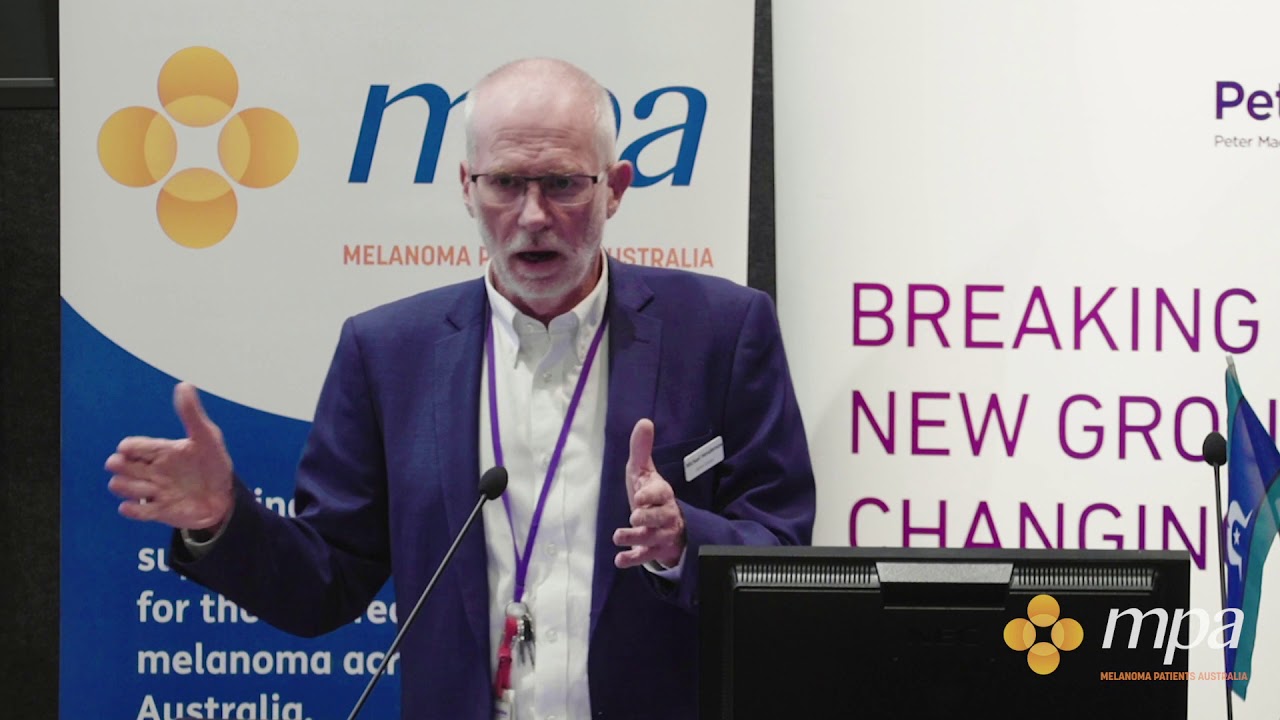 Professor Michael Henderson speaking at the Melanoma Patients Australia forum at Peter Mac in 2019
Professor Michael Henderson speaking at the Melanoma Patients Australia forum at Peter Mac in 2019
“Ring this number”
For the next 16 years, Malcolm’s career took him across Australia. In 2017, he was living back in Perth when the prospect of a new job prompted a medical check-up.
“My GP did all the tests, and I checked all the boxes. He gave me a container and asked me to return a stool sample. I went fishing and promptly forgot about it.”
Malcolm lowers his head as he recalls his GP having to follow up with him. “I didn’t want to do it, but he said he couldn’t sign off on the medical until he had that sample.”
Begrudgingly, Malcolm returned the stool sample, which was found to contain small traces of blood. The next step was a colonoscopy, which revealed a large polyp high up in his colon.
Waiting to receive the results of the biopsy, Malcolm recalls feeling very alone in the empty waiting room. “I knew something was wrong.”
Malcolm learned they had detected melanoma in his upper colon.
“The specialist in Perth told me he had never seen anything like it in his 35 years of practice, and he wasn’t sure what to do.”
Malcolm pulled out his phone, looked up Professor Henderson, and instructed the specialist to “ring this number”.
“The Prof told me to get on a plane,” Malcolm recalls. “I didn’t hesitate.”
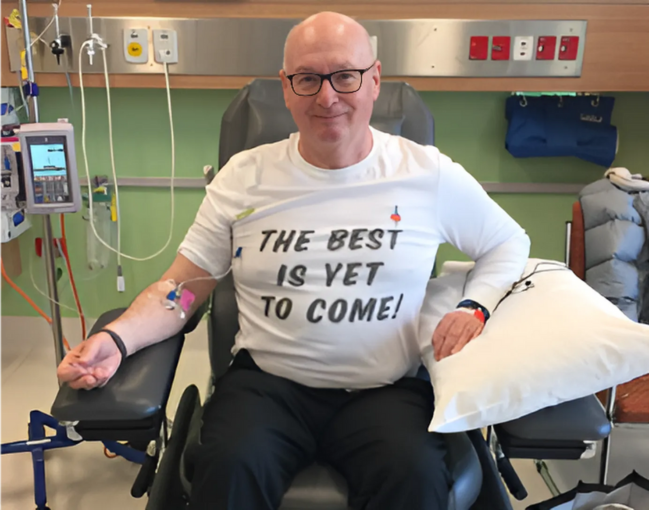 The best is yet to come: Malcolm had t-shirts made featuring slogans that inspired him, which he wore to Peter Mac for his treatment
The best is yet to come: Malcolm had t-shirts made featuring slogans that inspired him, which he wore to Peter Mac for his treatment
A whiz-bang new invention
Within 24 hours, Malcolm flew to Melbourne for a full day of scans at Peter Mac. He underwent several scans of broad areas of his body, including magnetic resonance imaging (MRI), computed tomography (CT) and positron emission tomography (PET). Pathology confirmed metastatic cancer.
“I thought you could only get melanoma on the outside of your body or the skin, but the scans showed hotspots on my brain, lung, buttock and upper colon,” Malcolm said.
“No one told me to put my affairs in order. At that early stage, they didn’t think I’d last that long.”
Malcolm remembers the exact words Professor Henderson spoke when delivering a diagnosis of stage four melanoma. “If you were sitting in front of me 17 years ago, I wouldn’t have been able to help you. But now you’re going to go through immunotherapy.”
Immunotherapy is a type of cancer treatment that harnesses the body’s immune system to recognise and fight cancer cells. Unlike traditional treatments like chemotherapy and radiation, which directly target cancer cells, immunotherapy aims to enhance the immune system's natural ability to identify and eliminate the disease.
“Immunotherapy was a whiz-bang new invention. I didn’t understand it fully, but I knew it was my best shot. Time was of the essence. I had stage four melanoma, so we needed to act fast.”
Malcolm stayed in Melbourne and was scheduled for infusions of two drugs at three-week intervals over 12 weeks. “I had the benefit of never being admitted to the hospital and would either walk home to Docklands or catch a tram.”
However, the treatment did come with side effects. Malcolm describes breaking out in a rash, which is a common reaction. After the first treatment, he also experienced uncontrollable eye watering, which his endocrinologist was able to solve with medication.
As Malcolm understood it, the greatest cause for concern was the hotspot in his brain. If they could get the brain metastasis under control, they could then operate on the others if necessary.
“I was diagnosed in late June 2017 and started immunotherapy in early July. By the end of September, I was declared cleared.”
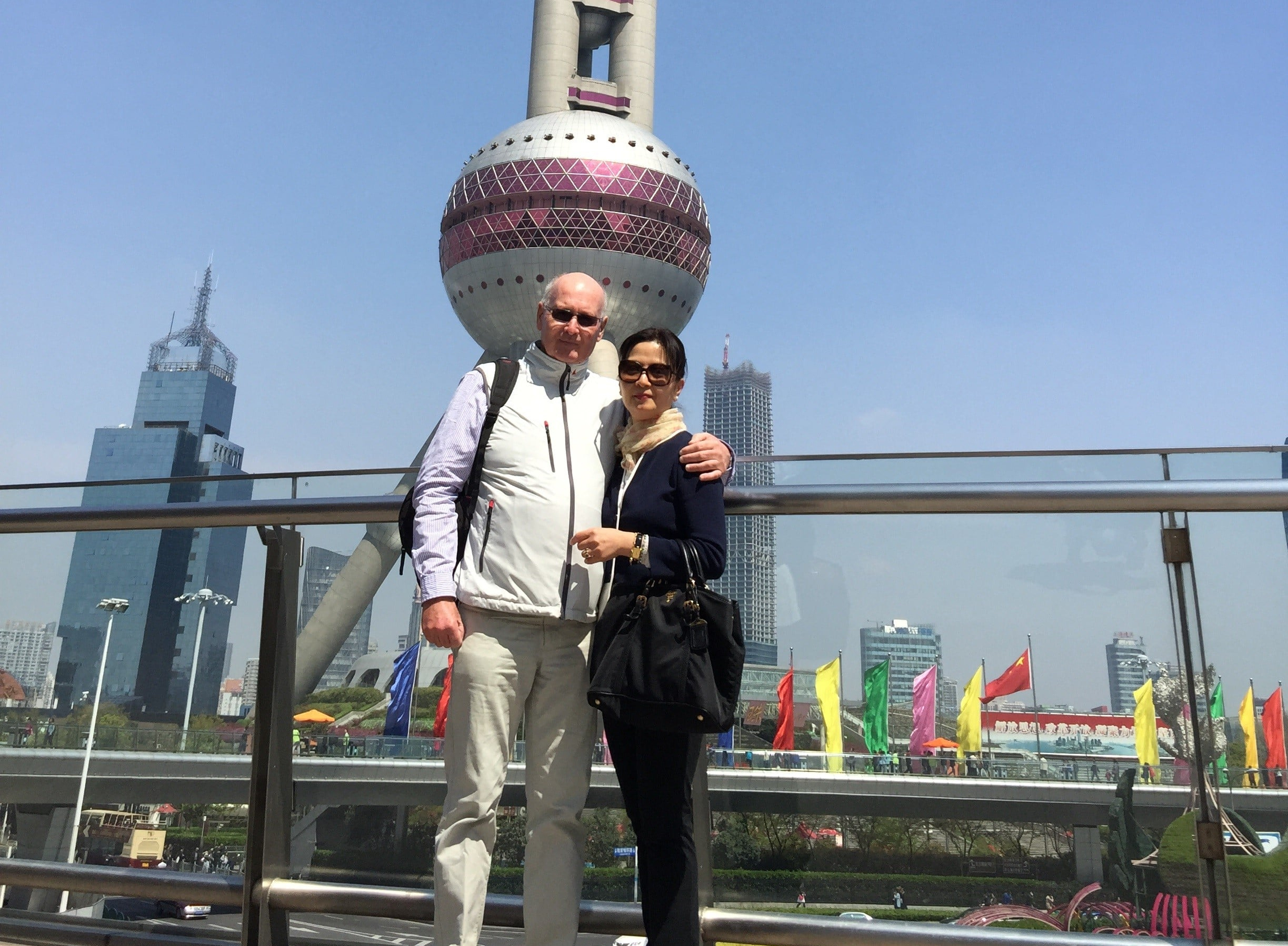 Malcolm travelling in Shanghai with his partner, Ai-Li
Malcolm travelling in Shanghai with his partner, Ai-Li
Hope for the future
Now aged 69, Malcolm is cancer-free and enjoying life with his wonderful partner Ai-Li, whom he describes as a “gem”. “She was the champion through all the grim and awful stuff,” he says.
Having lived through it all, Malcolm doesn’t think of himself as a ‘survivor’. “I don’t like the word; it’s not in my vocabulary.”
“I don’t really dwell on the past – you play with the cards you’re dealt in life. I’ve had two cards so far, so I’m always thankful. Seeing others whose treatment might not be going so well makes you think how lucky you are.”
Now back in Perth, Malcolm journeys to Peter Mac every 12 months for regular scans and consultations. “When I first came to Peter Mac, it was because I was living in Melbourne. After my second diagnosis, I came back because I couldn't get the treatment I needed elsewhere.”
He marvels at the advances in treatment since his first diagnosis, musing that his later diagnosis would have been untreatable if he had presented with it all those years ago. “I think immunotherapy is the future, especially with advancements like T-cell therapy.”
Malcolm’s hope for the future of research is that everyone can access a remedy, and that the side effects will be less invasive over time. “I hope that you can go to your GP, get a script, take a ‘magic pill, and that’s it.”
He believes that investing in cancer research is crucial to making this vision a reality and continues donating to Peter Mac to help nurture the next generation of talented clinician-researchers.
Thanks to support like Malcolm’s, scholarships from Professor Henderson’s Melanoma Education Fund have been awarded to:
- Dr Aparna Rao, who is developing better techniques to understand the metabolism of immune cells, and how these metabolic processes can be manipulated to enhance the body’s ability to fight melanoma.
- Dr Lavinia Spain, who is investigating the impact of a high-fibre diet on patients with melanoma who are being treated with immune checkpoint inhibitors, to reveal whether dietary changes can improve treatment outcomes or reduce side effects.
- Dr Michelle Goh, who is examining skin-related side effects that can occur when patients receive immunotherapy for melanoma, such as rashes, itching, and other dermatological issues that arise due to the immune system’s response to treatment.
Reflecting on the importance of ongoing philanthropic support, Malcolm adds, “you never know when you’ll need these services. It could be next week, or it could be a family member in need”.
Special thanks to the Australian Cancer Survivorship Centre, who first shared Malcolm's story here.
@Follow us on Instagram (@SupportPeterMac)

